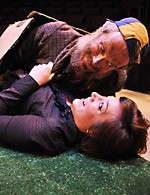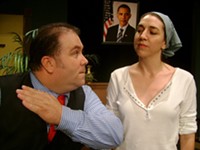The Positively Serene Death of Sir Ritter Hans Von Wittenstein Zu Wittenstein
Aggressive Muse's adaptation of Ondine is long, bloated, and lacking in precision
Reviewed by Hannah Kenah, Fri., Aug. 29, 2008

The Positively Serene Death of Sir Ritter Hans Von Wittenstein Zu Wittenstein
Blue Theater, through Sept. 6
Running time: 2 hr, 50 min
There is a trend with new plays that goes something like this: 90 minutes, no intermission. There is room for longer works, but you better need every second. Aggressive Muse's debut production, The Positively Serene Death of Sir Ritter Hans Von Wittenstein Zu Wittenstein – Ritter Hans, for short – needs almost none. After nearly three hours and two intermissions, the audience will learn that there is nothing particularly serene about the death of Ritter Hans. A vision statement at the back of the program describes the company's view that theatre has grown overly complex and full of strife. Aggressive Muse intends to "revive the great bardic tradition of simple, imaginative storytelling" and help audiences and artists rediscover imagination. Using a vision statement to describe what is lacking in the work of your peers and what you will consequently provide is bold. And it sets you up for a big old slapstick fall.
Ritter Hans is an adaptation of Jean Giraudoux's Ondine and is in essence a simple story: Two women love one man. However, in the hands of Aggressive Muse, the story fails to remain simple. Authors Josie Collier (who also directed) and Kate Meehan devised a script riddled with subplots, hurried exposition, and cumbersome devices. By the second hour, the story is bloated and confused. By the third hour, dead characters are coming back to life, and the end is nowhere in sight.
A reflection of this show's failure can be seen in the visual landscape. The sets and costumes are mindless. Some characters look to be at a high school prom, others in a Restoration comedy, others in a Tarantino film. Several actors have their faces obscured by costume elements. The paintings hanging in the palace seem to have been pulled from a motel or an elementary school art class. Ritter Hans has three movement directors, a fight choreographer, and not one moment of precision. Nothing is built on ground that can support tension or conflict or focus. The actors are working so damn hard to demonstrate their fury and passion that there is no room left for the audience to feel anything. A few actors, most notably Lindsey Reeves, Tamara Jolaine, and Abby Jones, seem capable of more than this production and its misdirection allows them. As for the "rock musical" element promised in the marketing materials, it's more like rock karaoke: The few songs are sung over the strains of a canned electric guitar. Though some are enjoyable – the show comes closest to real emotion when the court is singing "All Is Well" to its sickly queen – none of them advances the plot, a plot in desperate need of forward motion.
The most interesting thing to happen onstage at the performance I saw was the use of an actual gutted fish. One actor was slapping another actor with it. The thing got loose and hit an audience member. Gross. Hilarious. Unfortunately, the prop was for an entirely unnecessary subplot about Ondine's love of a trout. A love that lasts for that one scene and matters not a bit to the rest of the play. Such is the case for so many of the inconsequential, negligible story elements.
The second intermission hit at 10:15pm. Late into Act III, Ondine is rehashing the same argument she has been having with Ritter Hans for the last three hours. She screams: "Not again! Not again!" I couldn't agree with her more. It seems in this case, the muse was aggressive about quantity, not quality. But Ritter Hans is Josie Collier's third attempt at staging the story of Ondine, and in the words of Samuel Beckett: "Fail again. Fail better." No one could argue that she didn't aim high.










